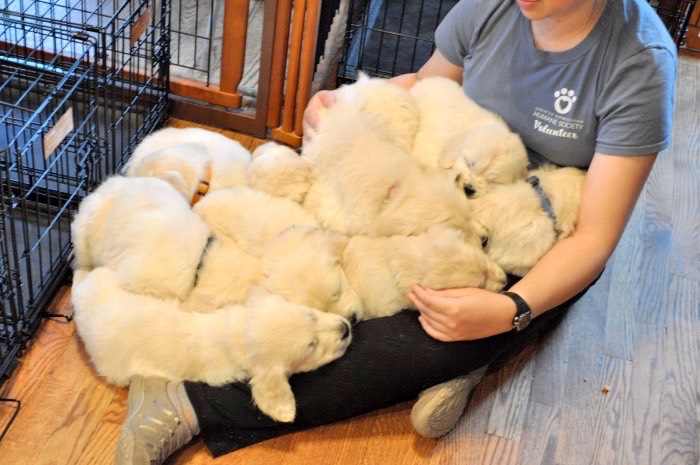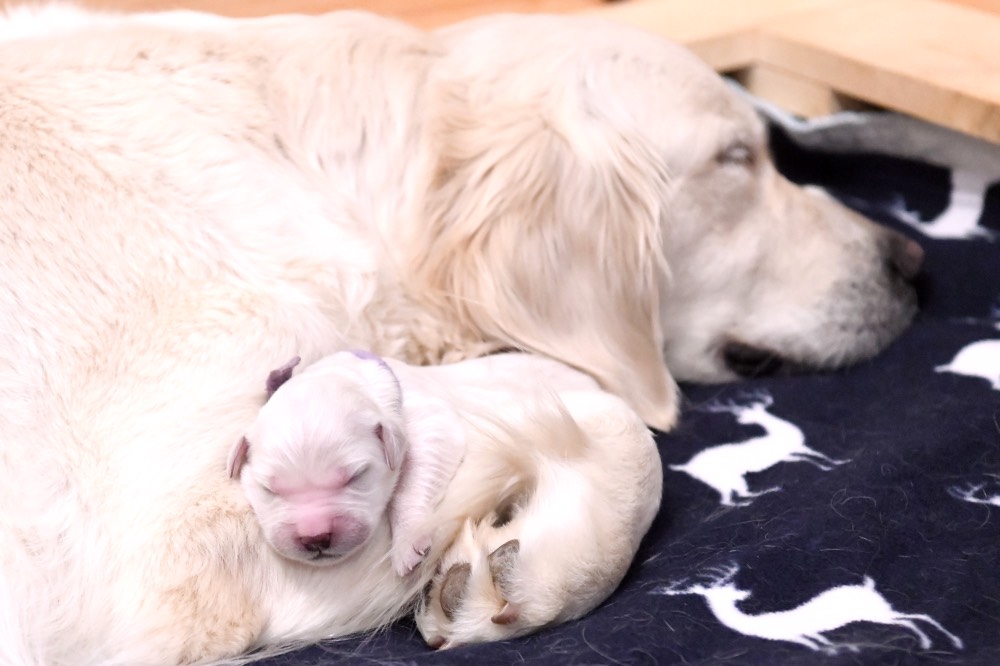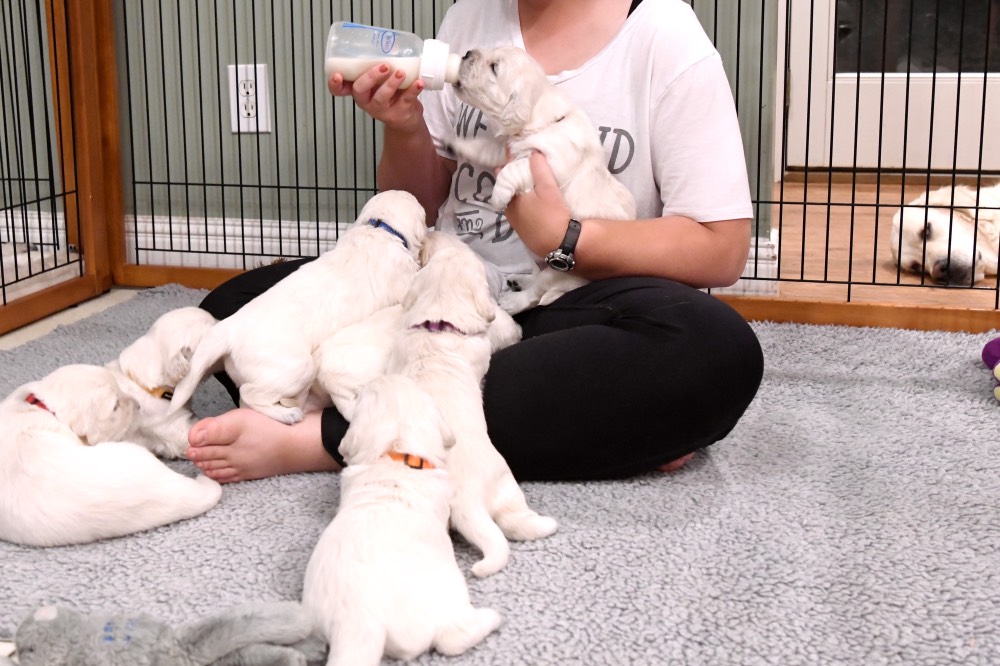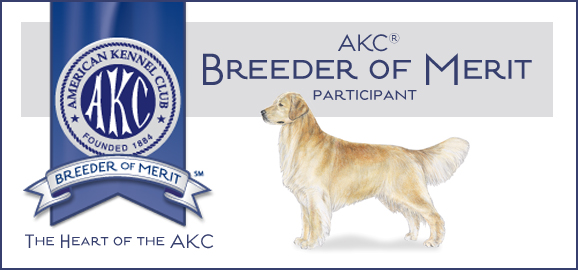Great puppies start out with good genetics and parents who are healthy and beautiful with good temperaments. Then, good rearing during the first weeks and months of life is imperative in order to shape the temperament that puppies are born with into temperaments most suitable as human companions. Summer Brook’s meticulously planned method of raising provides our puppies with the best possible foundation for life.
We are a family of dog lovers each with different gifts. See our About Us page for information on who works with our puppies. Scroll down to read about how we raise our puppies at Summer Brook Acres.

Our Focus in Raising Puppies
For puppies to achieve their full potential, careful attention must be paid to many details. There are four key areas that we focus on at Summer Brook.
The first area that we work on is with regard to cleanliness and preparing our puppies for house training and crate training.
The second area of work that we focus on at Summer Brook is in providing an enriching environment. We expose our puppies to many sights, sounds, and situations.
The third area we focus on with our puppies is providing beneficial human interactions. Our goal is to produce fantastic companions for families. We make sure that each puppy has positive experiences with a wide variety of people.
The fourth area of work that we do with our puppies is with regard to preparing them for our Focused Puppy Training Program. We begin this specialized training just after puppies are six weeks of age. Well over half of our puppies stay for our Focused Puppy Training program. We’ve set our training program up to start as early as possible for those puppies going through the full program. However, it is beneficial for those puppies leaving at 7 1/2 weeks as well.
Preparing for House and Crate Training
Cleanliness from Day 1 and guiding puppies in where to pee and poop will help to create a puppy that is much easier to house-train than one who has been raised by a typical breeder in a more traditional breeding setting. Puppies, by nature, want to keep their den clean, but if pee and poop remains where they live, they will loose their natural drive to potty away from where they live and will become difficult to house-train.
A Clean Environment and a Start in House Training
Many breeders work outside the home and puppy pens are only cleaned in the mornings and evenings. When we have puppies at Summer Brook, someone is here over 95% of the time and our pens are kept clean throughout the day. Summer Brook puppies begin their lives in a clean dry environment and we keep it that way until they leave our home. We change the bedding often in our newborn whelping boxes. We begin training puppies to pee and poop in a 3-foot by 3-foot pan of pine pellets at 3 1/2 weeks of age. And then finally, we train puppies to use a doggy door and begin the process of training them to potty outside by the time puppies are 5 weeks old.
A Start in Crate and Doggy Door Training
Crates are very helpful tools while house-training. Therefore, we take the time to condition puppies to not only tolerate crates, but to actually like them.
Starting somewhere between 4 weeks 5 days and 5 weeks 2 days, we begin teaching puppies to use a doggy door. This usually takes about 4 days of intense work. When all puppies are going in and out the door independently without being lured with food, we begin feeding puppies in wire crates.
Puppies Over 5 1/2 Weeks Eat Individually in Crates
By the time puppies are 5 1/2 weeks of age, they are eating all meals individually in crates. Crate training works best when the initial time spent in a crate is all positive. It is best to introduce forced confinement to a crate after a puppy is 10-11 weeks of age when possible. However, even for those puppies not left with us past 7 1/2 to 8 weeks, our positive use of a crate gives a super introduction to a crate making it easier for you to pick up where we’ve started.
Our Puppies Are Much Easier to House Train Than Most
7 ½-week old puppies cannot be totally house-trained. All puppies at this age lack sufficient bladder control and need taking out often. But our puppies are much easier to house train than most because of the way we raise them.
Raising Puppies Involves Providing an Enriching Environment
Providing an enriching environment with appropriate levels of stress at the correct developmental stages is important. It will shape the confidence of a puppy. Studies have shown benefits in puppies being exposed to a wide variety of situations and experiencing mildly stressful situations at young ages. These puppies learn to cope better with their environment and develop more confidence. Our experience in raising and training puppies has taught us the exact days in puppies’ lives that are optimum for learning certain behaviors and being exposed to certain environmental stressors.
Detailed Socialization Plans Broken Down By the Day
Our home environment is certainly not stressful. The environmental stressors that we are referring to are common situations that puppies will be exposed to in life. These mildly stressful situations must be created. We have very detailed plans for the situations that we expose our puppies. Our plans are broken down by our puppies’ ages to the day.
A Super Start in Exposure to Sights and Sounds in Our World
For the entire time puppies are at our home, they are exposed to the common sights and sounds of a very busy home. Vacuum cleaners running, many people coming in and out, music, and TV are every day sounds. In addition, we add mild environmental stressors that are at appropriate levels for their ages as we expose puppies to various situations. Puppies are not taken off our property. There is much environmental exposure that is still needed once puppies leave us, but we give our puppies a good start.
Early Neurological Stimulation for Young Puppies
Our work with puppies begins shortly after birth. Early Neurological Stimulation is from 3 days to about 2 weeks of age. This is our puppies’ first exposure to any type of stress. ENS (Early Neurological Stimulation) is a series of exercises that mildly stresses puppies. It includes holding them in various positions, touching their paw pads, and putting them on a cold cloth (for a few seconds). The U.S. military determined that these exercises help puppies to develop more confidence and a willingness to work through more difficult situations. Our early work with puppies also includes weekly nail trimming starting just a day or two after birth. This teaches them to willingly accept nail trimming without fear.
Startle Recovery
Once puppies’ eyes and ears open, we begin working with their ability to recover from loud unexpected sounds. We intentionally drop metal bowls so that puppies learn startle recovery. We also play sound effect CD’s starting at 3 weeks of age to expose them to sounds such as fireworks, thunder, and gunshots that we don’t always have first-hand access to.
Over a Hundred Puppy Toys
At 3 weeks, a weaning pen is added to the puppy whelping box and a wide variety of toys are introduced. We clean and change out toys daily until puppies are ready for new homes. We have well over a hundred puppy toys that we rotate to our puppies so that they always have something new to play with.
Outdoor Exposure
We expose puppies to the outdoors starting shortly after 4 weeks of age. Before leaving our home, puppies will be exposed to many outdoor sights and sounds: the sounds of lawn mowers, weed eaters, leaf blowers, 4-wheel drive vehicles, and even occasionally to the sound of electric saws and drills. 4-week old puppies spend minimal time outside, but this is a good age for an initial introduction.
Exposure to Larger Areas Inside
Starting at 5 weeks, puppies are brought out of their pen both in groups and individually to many different rooms in our home. Each room has a variety of different things that puppies might encounter in life. Puppies are also introduced to a larger area outside.
Opportunities for Puppies to Figure Out Mildly Stressful Situations
Our outside area has several fenced areas with open gates. Having these divisions teaches puppies to think through situations instead of sitting and crying. It often happens that a puppy is on one side of the fence while we are on the other. They must think through how to get to us and find the opening.
Small Agility Equipment
Starting at 6 weeks, puppies are lured with food onto miniature agility equipment. We encourage each puppy with food to go onto a wobble board and a mini-teeter. We lure them through a tunnel. Dogs by nature are uneasy on unstable surfaces and in narrow spaces. These pieces of equipment help to ease these fears.
Safe Step Navigation
We also train our puppies to safely navigate the 2 steps into our side yard. We’ve heard of other breeders saying that navigating steps is difficult to teach. We think that teaching steps is best before puppies are 7 weeks of age and before they enter their first fear period. We’ve never raised a puppy to our knowledge that is afraid of steps. Our puppies want to go up the stairs when we go up there. Without gates, they wouldn’t hesitate to follow us up or down. We believe our success with steps is because we teach steps early, with only a few steps instead of on full flights, and with positive methods.
Instilling Confidence
Though our puppies are not overly timid to begin with, we’ve seen how the work that we do makes a difference in instilling confidence. If new families will continue the work that we start, even the most timid of our puppies will grow up to be confident dogs.
Providing Positive Human Interaction
Puppies’ initial interactions with humans will affect how well they bond to new families. It is vitally important that a puppy’s early exposures are positive.
A Start in Obedience Training
We begin our Focused Puppies Training Program exercises starting at 6 weeks of age. See our Trained Puppies page for more information on the training we provide here at Summer Brook
Raising Puppies: Ages and Stages
This next sections gives some details is to what we do with our puppies at various ages. For more information on this very important topic, see any of our girls pages to for links to pages of their past litters at different ages. Tara’s page and Eva’s page are good examples.
Raising Newborn Puppies

We start the bonding process with our puppies on day 1. Even though a puppy’s canine mother is the most important figure in the first couple of weeks of puppy life, human contact is important as well. Our newborn puppies are picked up and held often by our family and by people who work with us. They are weighed daily. Collars are adjusted. If the mom doesn’t keep the puppies perfectly clean, we rinse them off as needed with warm water. (Puppies actually think the warm water running over them feels good). Then we carefully dry them before putting them back with their mother. Someone spends the nights with puppies for their first 2 weeks. We are extremely involved with our puppies from start to finish.
Raising Puppies at 2 Weeks of Age

At 2 weeks, we will also bottle feed. Larger litters need supplemental nourishment in addition to mother’s milk. Unless puppies in smaller litters are over-weight from their mother’s milk, we will bottle-feed these puppies as well at least once or twice. This enhances the human bonding experience.
Raising Puppies at 3 Weeks of Age
At 3 weeks, we feed puppies a goat’s milk mixture. Their primary nourishment still coming from their mother’s breast milk. Most breeders start this feeding process in a big group bowl (a puppy saucer). However, we feed our puppies individually at this age while we hold them. We continue picking them up often. We cradle them on their backs and touch them all over so that they are used to human contact.
Raising Puppies at 4 Week of Age
At 4 weeks, a few visitors are allowed with puppies. The time our family and our workers spend with puppies increases. It is at 4 weeks of age that puppies become much more social and aware of their surroundings.
Raising Puppies at 5 Weeks of Age
Starting at 5 weeks, we invite a variety of people to visit. Puppies are socialized beyond our family and those who work for us. We begin feeding treats from our hands as prt of our training. This serves to further bond our puppies to humans.
Raising 6 and 7 Week Old Puppies
We continue to increase the number of visitors with puppies at 6 weeks. However, the way that our family and employees work with puppies becomes more intentional and purposeful. Six-week old puppies have a good capacity for learning and they are still not quite into their first fear period. It is during the time period from 6 to 7 ½ weeks that we really begin to stretch their abilities. The section above on environmental stressors discusses our work with 6-week old puppies in more detail. As puppies learn to cope with environmental stressors, they also learn to trust us. We build this trust as we help and encourage them to overcome these stressors.
At six weeks, we also begin our preliminary training exercises. You can read more detail on in our section on training.
Raising Puppies the Summer Brook Way: The Importance of Doggy Door Training
A big part of our training is teaching puppies to go in and out of a doggy door. This training is important to all three of our core areas of work in raising puppies.
House Training
The use of a doggy door is hugely valuable in house-training. Young puppies have very little bladder control. Without a doggy door, you’d need to take some out sometimes every 20-30 minutes. A doggy door is a great tool for letting a puppy out automatically every time he needs to potty while his bladder is maturing and he is being conditioned to like a crate. Initially, we walk out with our puppies OFTEN during the day. With consistency, puppies learn to go out on their own fairly quickly. Providing a way for puppies to get themselves out prevents mistakes and builds a super foundation.
Confidence in Tight Spaces
A doggy door is also a good kind of stress in the initial teaching phases of teaching it. It teaches puppies to be more comfortable in tight spaces and with things flopping on top of and in front of them.
Bonding to Humans
Coming through a doggy door also bonds a puppy to humans. As they come through the mildly stressful door and are rewarded for it, trust and respect for humans grows.
Gives an Alternative to Crate Confinement For House-training While We Build Crate Desire
Puppies that are kept with us through 10 weeks become fairly proficient at using the doggy door while we work with them in crates in positive ways. The use of the doggy door gives us an opportunity to instill good potty habits in a puppy without having to crate him when we aren’t able to watch him. We can delay our use of crates in ways that puppies don’t enjoy while we continue to build good feelings in a puppy toward his crate.
Makes Continued House Training Easy
The doggy door training makes house-training much easier. Our 10-week old puppies are in the habit of heading toward the door when they need to potty. If a new family will take their Summer Brook puppy outside often enough, house-training will be easy. We are told time and time again how easy our puppies are to house-train.
A Few Final Details About How We Raise Our Puppies
Worming and Vaccines
Our puppies are wormed at 3 weeks, 5 weeks, and 9 weeks. They receive a vet check at around 8 weeks of age and will receive their first DPv vaccine at 9 weeks of age.
We rarely send puppies home prior to 10 weeks. If we did, it would be an entire litter and there will be no vaccine unless puppies are 8 week 3 days old or more. We have strong opinions about minimal vaccines and will not vaccinate a puppy even a day prior to 8 weeks, nor will we send a puppy home within 3 days of receiving a vaccine. For puppies picked up prior to 8 weeks 3 days, we recommend waiting until new puppies are at least 8 weeks of age (preferably 9 weeks) AND have been in their new home for at least 3 days.
Every Detail Of Raising Your Puppy Has Been Carefully and Meticulously Thought Through
Every aspect of raising puppies has been thoroughly thought through. We have plenty of help. Every puppy will be raised in a manner that meets our very high standards. We have a very scheduled and meticulous plan from birth to 8 weeks. Our plan has been tweaked to perfection (well….almost…..we’re always tweaking!).
Many Hands Involved in Raising Our Puppies
We have more help than we’ve ever had.
Our two daughters (in their early 20’s) are heavily involved in the work here at Summer Brook. (It is a mother’s dream to have both daughters back at home working with us again!) Jenna is a very talented and experienced trainer and works with photography and the website. Elise works primarily with whelping, taking care of very young puppies, and taking care of our adult dogs. Darrell (husband and father) is now taking care of communications while Karen (wife and mother) has a hand in everything.
We also currently (in 2019) have three teenagers who work with us. Emma has been with us for four years and plans on going to vet school. The other two high schoolers have been working for Summer Brook for over two years. We realize that raising puppies can be unpredictable in terms of numbers of puppies. Our team at Summer Brook has planned for every aspect. We will continue to raise our puppies in the manner that has earned us the reputation that we now have.
Find Out More About the Summer Brook Method of Raising Puppies
Go to our Available English Golden Retriever Puppies page to see if we have anything available. We rarely have anything available without a wait. However, this page has information about current or future litters. Our Available Puppies page also has links to weekly puppy pictures and information pages. These pages have current litter pictures as well as information on what our puppies are doing at these particular ages. You can learn more specifics on these pages as to how we raise our puppies and what we do with them at various ages.
See our How to Reserve page if interested in adding one of our English Cream Golden Retriever puppies to your family.

